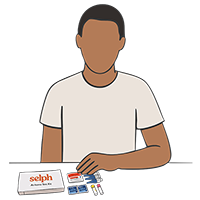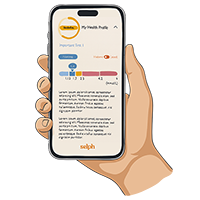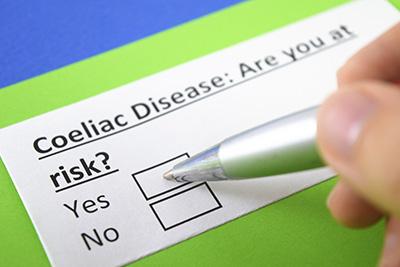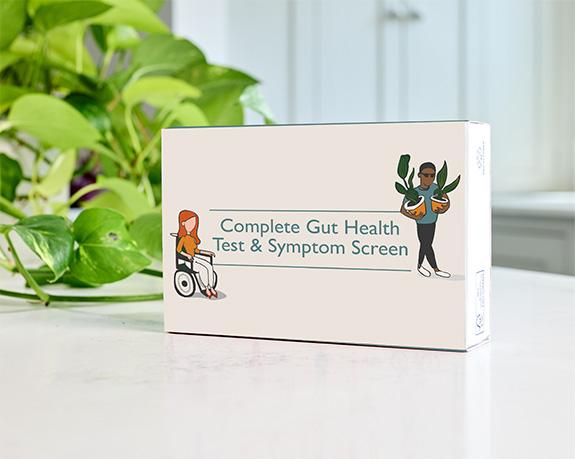Personalise your test
Add to your test
3 add-ons availableChoose how to collect your sample
5 optionsFinger-prick blood collection
Total price:
£59.00
Includes our
Coeliac Disease Blood Test
Want to know if you have coeliac disease (celiac disease)? Take a coeliac disease blood test to find out.
What you need to know about our Coeliac Disease Blood Test
Our Coeliac Disease Blood Test is a comprehensive antibody test that's recommended for diagnosing coeliac disease. The test is fast, accurate and you get a doctor's report explaining exactly what your results mean.
The bottom line is that if you want to know if you have coeliac disease, this is the blood test you need.
What is coeliac disease?
Coeliac disease affects about 1-in-100 people but most don't know they've got it. Although some people refer to coeliac disease as "gluten allergy", coeliac disease is actually an autoimmune condition, not an allergy. This means that coeliac diseased is caused by your immune system reacting against your own body. In coeliac disease, a substance called gluten triggers your immune system to attack the lining of your gut, causing inflammation and gut symptoms. Gluten itself is harmless, it's the body's reaction to it that causes a problem. Gluten is found in wheat, barley and rye so you'll find it in bread, pasta, cakes and even beer.
Coeliac symptoms?
Our coeliac blood test is for you if you have been experiencing any of the following symptoms commonly associated with coeliac disease:
- Stomach pain and cramping
- Nausea and vomiting
- Bloating
- Diarrhoea
- Tiredness
- Weight loss
- Skin rashes
You can also have these symptoms after eating gluten without having coeliac disease. This is called non-coeliac gluten sensitivity. The main way to tell the difference between Coeliac Disease and non-Coeliac gluten sensitivity is to take a Coeliac Disease test.
Lastly, it's important to know that a third of people with coeliac disease don't have any symptoms. This is called "silent-coeliac disease".
What do the coeliac blood test results mean?
The coeliac disease blood test checks your levels of tissue transglutaminase IgA (TAA) antibody.
| TAA Level (IU/ml) | Meaning |
| < 0.3 | Possible IgA deficiency. We'll go on and test your total IgA levels and deamidated gliadin peptide antibodies if necessary. |
| 0.3 - 6.9 | Normal: coeliac disease very unlikely |
| 7-10 | Borderline. Coeliac disease possible, we'll go on and test your anti-endomysial IgA antibody levels for further information. |
| > 10 | Positive. Coeliac disease likely, we'll go on and test your anti-endomysial IgA antibody levels to confirm. |
If the test result is negative, but you still get symptoms when eating gluten, then you may have non-coeliac gluten sensitivity.
What's the difference between coeliac disease and gluten intolerance?
Coeliac disease is an autoimmune reaction to gluten characterised by inflammation in the bowel. However, some people complain of gut symptoms when eating gluten but have no inflammation in the bowel. This is "gluten intolerance" or "non-coeliac gluten sensitivity". The only way to tell the difference between non-coeliac gluten sensitivity and coeliac disease is to take a coeliac disease test.
How it works

Do your test
You'll get your kit next-working day.
Collect your sample at home and send it back to our UKAS-accredited lab for analysis.

Get rapid results
We'll let you know when the lab have received your sample for analysis.
You'll get your results and doctor's report in your online dashboard. You'll also be able to download your formal lab report to share with your GP if you wish.

Improve your health
Numbers are useful but it's what you do with them that counts.
We'll give you advice on how to improve your health based on your results. You can also book a consultation to discuss your results with one of our doctors (costs extra).
What's tested in the Coeliac Disease Blood Test?
Our coeliac test is a fully comprehensive multi-step panel including free confirmatory testing so you can have full confidence in your results.
Please note that you need to have had gluten in your diet in the 6 weeks before testing for coeliac disease blood tests to be accurate.
Tissue transglutaminase IgA antibodies
This is the gold-standard, NHS-approved blood test for coeliac disease. We measure this in all cases.
Total IgA antibodies
If your tissue transglutaminase IgA level is low, we'll go on and test your total IgA antibody level to make sure you produce this type of antibody.
Deamidated gliadin peptide IgG antibodies
If you're found to be IgA deficient, we'll go on and test your deamidated gliadin peptide IgG antibody levels which can indicate coeliac disease.
Endomysial IgA antibodies
If your tissue transglutaminase level is high, we'll go on and test your endomysial antibody levels to confirm that coeliac disease is highly likely.
Find out more about testing for coeliac disease
The test for coeliac disease will not be accurate if you do not have gluten in your diet. Make sure your diet contains wheat, barley or rye in the 6 weeks before testing for accurate results.
Children may struggle to use a finger-prick collection kit. All children will need to be supervised / helped by an adult when using the finger-prick blood collection kit.
If you're not able to eat any gluten at all because of symptoms then this test won't be as accurate in detecting coeliac disease.
If you're unsure if you should use this test panel, please contact us for advice.
The coeliac disease blood test is analysed by The Doctors Laboratory (TDL), one of the largest laboratories in the UK. TDL test for both the NHS (e.g. University College Hospital London) and private providers such as ourselves. The exact same testing platforms and procedures are used in either case.
However, no test is perfect and there can always be "false positive" and "false negative" results. The tissue transglutaminase antibody test for coeliac disease has a sensitivity of 91% and a specificity of 91%. The liklihood that you don't have coeliac disease if you get a negative test result is approximately 99.7%ref.
Coeliac disease is an automimmune condition, meaning that your body creates an immune response against your own cells. This autoimmune reaction is triggered by gluten. However, we're not 100% sure what causes some people to have coeliac disease while most don't. We do know that it's associated with certain genes. People with coeliac disease will have one of three types of HLA gene: HLA-DQ 2.5, HLA-DQ 8 or HLA-DQ-2.2. However, around 40% of people have one these HLA types but only 1% of people have coeliac disease. This means that environmental factors - e.g. diet or infections - are probably also important.
The main treatment for coeliac disease is to avoid gluten by following a "gluten-free diet". This generally involves foods that contain wheat, barley or rye.
If someone with coeliac disease eats gluten, it will trigger an autoimmune reaction causing inflammation in the small bowel and potentially elsewhere in the body.
This can have lots of effects such as bowel symptoms, failure to absorb nutrients leading to deficiencies, infertility, nerve problems and even an increased risk of cancer. This is why it's so important to diagnose coeliac disease. Unfortunately, 75% of people with coeliac disease don't know they have it.
Yes, celiac disease is just the American spelling of coeliac disease. Unfortunately, many people refer to coeliac disease by incorrect terminology such as "gluten allergy" or "gluten sensitivity". These can be misleading so it's best to stick to coeliac disease.
Still have questions?
If you have any questions, we're here to help. Our customer service team is hands-down the best you'll ever deal with. They're smart, friendly, knowledgeable and will get back to you in a flash.
We've got the stats to back it all up.
When it comes to health, you want to know you’re in safe hands. We’ve got decades of experience, and we’ve got the stats to prove it.
20+
Years in healthcare
65,000+
5 star reviews

1 million+
Happy customers
2 million+

Our Privacy Promise
Your health is yours. It's personal. That's why we're committed to keeping your data safe and secure. Here's how we do it:
See our Privacy Policy and our Terms of Service for more info.







